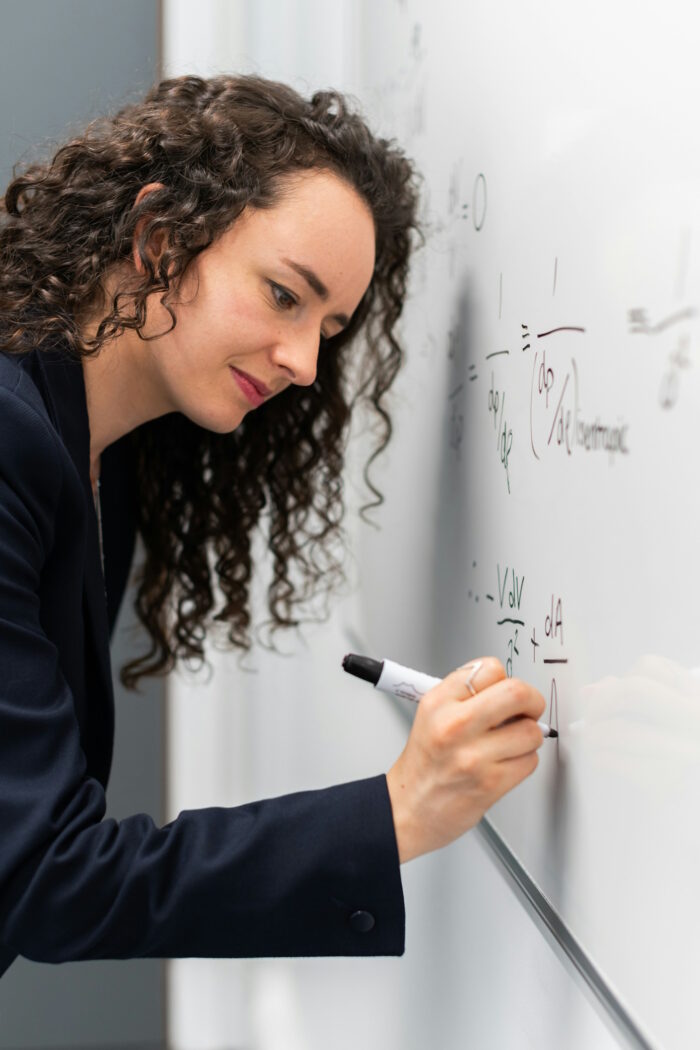Mathematics
- UCAS Code: G100 BA/Math
- Campus Code: 4
- Duration: 3-4 years
- Places per year: 5-6
The Cambridge Mathematics course is one of the most successful in the world for producing mathematicians and theoretical physicists. It is intensive, demands systematic hard work, and is immensely rewarding. The demand for our mathematicians is high in business, commerce and industry, as well as the academic world.
Lecture courses are taught by some of the world’s top mathematicians, and you will receive both unparalleled learning support and outstanding pastoral care.

Mathematics
Looking for something specific? Use these quick links to get to where you want to go…
Course Overview
This is a flexible course where you can study a variety of different subjects, from abstract logic to black holes. After set courses in the first year, you’ll have more choice each year.
You choose from 2 core options:
- Pure and Applied Mathematics, if you want to carry on with Mathematics after the first year
- Mathematics with Physics, if you want to study Physics after the first year
We’ll ask you which option you prefer when you apply for this course. It’s still possible to change your mind when you start the course. If you take Mathematics with Physics in the first year, you can still carry on with Mathematics in the second year.

How You Learn
You will usually have 12 lectures and 2 supervisions each week during the first year.
In second and third year the pattern and number of lectures and supervision depends on the topics you’re studying.
Assessment is mostly through written examinations in the first three years.
There are also additional computer projects in second and third year, which are assessed through reports and programs submitted before the summer examinations.
In the fourth year, you’ll take an exam for each of your courses. You’ll also submit an essay on a current research topic.

Entry Requirements
Minimum Offer Level
A-Level: A*A*A
IB Diploma: 41-42 points, with 776 at Higher Level
Other: See the University’s Entrance Requirements page
STEP: All offers include certain grades in STEP Mathematics – this is most commonly 1,1 in Papers II and III. Depending on individual circumstances, we may make an A Level applicant an offer which will be met if they achieve either A*A*A with at least grade 1 in two STEP papers or A*A*A* with at least grade 1 in one of the two STEP papers taken.
Subject Requirements
You will need A levels/IB Higher Levels (or the equivalent) in:
- Mathematics
- Further Mathematics (A level only)
If you’re studying IB, we ask for Analysis and Approaches for this course.
If you’re applying to Mathematics with Physics, you must have taken the Mechanics section of Further Mathematics or have taken A level Physics in addition to Mathematics and Further Mathematics.
Colleges will normally require A*/7 in Mathematics and Further Mathematics.

Admissions Process
Written Work
None required.
Admissions Assessment
There is no written assessment for this course at Trinity Hall.
Interviews
Two interviews of around 25 minutes, where you will work through maths problems.

Suggested Resources
STEP Resources
A collection of free online STEP Preparation resources is available to help potential university applicants prepare for sitting STEP Mathematics examinations.
These resources have been designed as a series of linked modules for individual additional study. The programme is aimed at maths students who have completed the first year of A-level or equivalent study: students can start working on them from the summer after the end of Year 12 (past STEP candidates often say they wished they had started preparation early), but equally it is possible to start later and catch up.
Each module consists of problems, articles, worked examples, advice for STEP candidates and much more. By working through these modules, students will learn and practise the problem-solving skills and new mathematical techniques needed for STEP, and have a good idea of what to expect by the time they sit the exam at the end of Year 13.
Free Maths Resource
Stephen Siklos’s Advanced Problems in Mathematics is a useful resource for teachers and students and is free to read online and download. The questions analysed in this book are all based on recent STEP questions selected to address the syllabus for Papers I and II, which is the A-level core (i.e. C1 to C4) with a few additions. Each question is followed by a comment and a full solution. The comments direct the reader’s attention to key points and put the question in its true mathematical context. The solutions point students to the methodology required to address advanced mathematical problems critically and independently. This book is recommended as preparation for any undergraduate mathematics course, even for students who do not plan to take the Sixth Term Examination Paper.
Video: a Mathematics Interview
This video shows what you can expect from a typical Mathematics interview at the University of Cambridge.
This particular example shows a mock online interview. In an in-person interview everything would be very similar, but of course you and the interviewers would be sitting at a table, and writing on paper instead of an online whiteboard.
